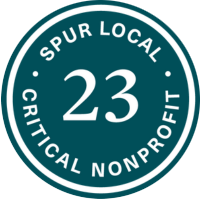This is a guest post by Zach Teutsch, founder of Values Added Financial, Ward 4 resident, and a long time JUFJer.
Listen up, DC: I want you to raise my taxes. Yes, you heard right. I want you to raise my taxes. Why? It’s common sense: when people have access to the basic necessities–affordable housing and high quality childcare, to name a few–the entire District benefits. And higher taxes are what will fund those basic needs.
When I left the federal government following an administration change, I founded a business, Values Added Financial. We’re a DC business that helps middle-class, wealthy, and very wealthy people with their financial planning, investment management, and tax-related decision making. our community. We help clients build financial lives they feel good about and offer values-aligned investment, tax, life design, real estate, college funding planning, charitable giving and other planning services. And what I’ve seen in my work is that, like me, the vast majority of my clients who make over $250,000 would be happy to pay modestly higher taxes to support and expand policies that uplift the most vulnerable residents of our city.
In the past, the DC Council has questioned whether changes in the income tax bracket structure would cause wealthy people to relocate. As it turns out, changes in taxation have little influence on families’ choices about where to live. In my professional experience, people don’t consider differences of a few percent in taxes when they decide where they want to build their lives. The things that tend to sway their decisions are about the experience of living in a community, including the quality of life of our most vulnerable workers.
According to data that Cornell professor Cristobal Young collected from 45 million tax returns, millionaires actually move quite rarely, only half as often as those with lower incomes. When they do move, 85% of the time their move is tax-neutral or results in higher taxes. In any given year, only 0.3% of millionaires make a move that results in lower taxes. Most major cities have a higher rate of attracting new millionaires than that. Which is to say, though raising taxes will generate more equity and revenue, empirical research and experience show that it won’t result in meaningful flight of millionaires. Quite the opposite, we are likely to gain more millionaires than we lose.
Indeed, we live in one of the wealthiest cities in the history of the world and yet many DC residents are struggling. Even before the pandemic, basic necessities like quality childcare and early childhood education were out of reach for many in DC, especially Black and brown families. Now childcare providers have been devastated by the pandemic and are in danger of closing permanently. Since COVID shuttered day care centers and closed schools, women have borne the worst of the pandemic, with an alarming number, especially Black and brown women, dropping out of the workforce. The District must invest sufficient resources in key social supports like a strong child care sector and more affordable housing–it is a moral duty.
One of my areas of professional expertise is serving families with children and understanding their needs. These families do sometimes consider moving out of DC, but it’s not because of taxes. Rather, it’s because of the high cost and low availability of child care and housing. And that’s a problem even for people who have a financial advisor. It is quite a bit more challenging for people who don’t.
I want to live in a city where we use our prosperity to make life better, especially for those who most need a break. By modestly raising taxes for me and other people like me, we can make a big difference in critical areas like the affordability and availability of childcare. Higher taxes won’t drive me out of town. Quite the opposite, it’ll make me prouder than ever of my community. So please, raise our taxes. Use them to finally invest enough to address the housing, childcare, and educational needs of our neighbor’s families. Raise my taxes to reduce the suffering and systemic inequalities in our city.
###






